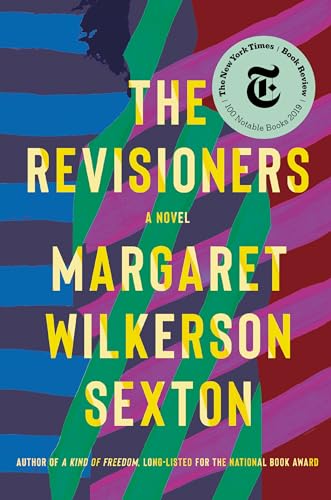We wouldn’t dream of abandoning our vast semi–annual Most Anticipated Book Previews, but we thought a monthly reminder would be helpful (and give us a chance to note titles we missed the first time around). Here’s what we’re looking out for this month—for more November titles, check out our Second-Half Preview. Let us know what you’re looking forward to in the comments!
Want to know about the books you might have missed? Then go read our most recent book preview. Want to help The Millions keep churning out great books coverage? Then sign up to be a member today.
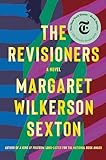 The Revisioners by Margaret Wilkerson Sexton: Sexton’s first novel, A Kind of Freedom, was on the longlist for the 2017 National Book Award and appeared on a number of year-end best-of lists. The Revisioners, a multigenerational story focusing on black lives in America, begins in 1925, when farm owner Josephine enters into a reluctant, precarious relationship with her white neighbor, with disastrous results; nearly 100 years later, Josephine’s descendant, Ava, out of desperation, moves in with her unstable white grandmother. The novel explores the things that happen between; the jacket copy promises “a novel about the bonds between a mother and a child, the dangers that upend those bonds.” (Edan)
The Revisioners by Margaret Wilkerson Sexton: Sexton’s first novel, A Kind of Freedom, was on the longlist for the 2017 National Book Award and appeared on a number of year-end best-of lists. The Revisioners, a multigenerational story focusing on black lives in America, begins in 1925, when farm owner Josephine enters into a reluctant, precarious relationship with her white neighbor, with disastrous results; nearly 100 years later, Josephine’s descendant, Ava, out of desperation, moves in with her unstable white grandmother. The novel explores the things that happen between; the jacket copy promises “a novel about the bonds between a mother and a child, the dangers that upend those bonds.” (Edan)
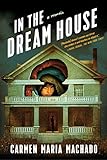 In the Dream House by Carmen Maria Machado: After the runaway and wholly deserved success of her magnificent short story collection, Her Body and Other Parties, Machado returns with a memoir chronicling an abusive relationship. Juxtaposing her personal experience with research and cultural representations of domestic abuse, the book defies all genre and structural expectations. Writer Alex Marzano-Lesnevich writes that Machado “has reimagined the memoir genre, creating a work of art both breathtakingly inventive and urgently true.” (Carolyn)
In the Dream House by Carmen Maria Machado: After the runaway and wholly deserved success of her magnificent short story collection, Her Body and Other Parties, Machado returns with a memoir chronicling an abusive relationship. Juxtaposing her personal experience with research and cultural representations of domestic abuse, the book defies all genre and structural expectations. Writer Alex Marzano-Lesnevich writes that Machado “has reimagined the memoir genre, creating a work of art both breathtakingly inventive and urgently true.” (Carolyn)
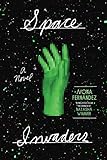 Space Invaders by Nona Fernández (translated by Natasha Wimmer): Chilean writer Nona Fernández is revered as one of the most important contemporary Latin-American writers, and her novel explores the experience of growing up in a dictatorship and trying to grapple with erasure and truth in adulthood. Daniel Alarcón writes, “Space Invaders is an absolute gem…Within the canon of literature chronicling Pinochet’s Chile, Nona Fernández’s Space Invaders is truly unique.” (Zoë)
Space Invaders by Nona Fernández (translated by Natasha Wimmer): Chilean writer Nona Fernández is revered as one of the most important contemporary Latin-American writers, and her novel explores the experience of growing up in a dictatorship and trying to grapple with erasure and truth in adulthood. Daniel Alarcón writes, “Space Invaders is an absolute gem…Within the canon of literature chronicling Pinochet’s Chile, Nona Fernández’s Space Invaders is truly unique.” (Zoë)
 The Book of Lost Saints by Daniel José Older: Spanning generations, Older’s latest tells the tale of a family split between New Jersey and Cuba, who grapple with the appearance of their vanished ancestor’s ghost. The ancestor, Marisol, went missing in the tumult of the Revolution, taking with her the family’s knowledge of their painful and complicated past. When Marisol visits her nephew, he starts to learn about her story, which hinges on “lost saints” who helped her while she was in prison. (Thom)
The Book of Lost Saints by Daniel José Older: Spanning generations, Older’s latest tells the tale of a family split between New Jersey and Cuba, who grapple with the appearance of their vanished ancestor’s ghost. The ancestor, Marisol, went missing in the tumult of the Revolution, taking with her the family’s knowledge of their painful and complicated past. When Marisol visits her nephew, he starts to learn about her story, which hinges on “lost saints” who helped her while she was in prison. (Thom)
 What Burns by Dale Peck: Dale Peck has published a dozen books—novels, an essay collection, a memoir, young-adult and children’s novels—and along the way he has won a Lamda Award, a Pushcart Prize, and two O. Henry Awards. Now Peck is out with something new: What Burns, his first collection of short fiction. Written over the course of a quarter-century, these stories are shot through with two threads that run through all of Peck’s writing: tenderness and violence. In “Not Even Camping Is Like Camping Anymore,” for instance, a teenaged boy must fend off the advances of a 5-year-old his mother babysits. And in “Bliss,” a young man befriends the convicted felon who murdered his mother when he was a child. Tenderness and violence, indeed. (Bill)
What Burns by Dale Peck: Dale Peck has published a dozen books—novels, an essay collection, a memoir, young-adult and children’s novels—and along the way he has won a Lamda Award, a Pushcart Prize, and two O. Henry Awards. Now Peck is out with something new: What Burns, his first collection of short fiction. Written over the course of a quarter-century, these stories are shot through with two threads that run through all of Peck’s writing: tenderness and violence. In “Not Even Camping Is Like Camping Anymore,” for instance, a teenaged boy must fend off the advances of a 5-year-old his mother babysits. And in “Bliss,” a young man befriends the convicted felon who murdered his mother when he was a child. Tenderness and violence, indeed. (Bill)
 White Negroes: When Cornrows Were in Vogue … and Other Thoughts on Cultural Appropriation by Lauren Michele Jackson: Scholar and writer Lauren Michele Jackson, who has written many incisive essays on popular culture and race for Vulture and elsewhere, now publishes her first book, an in-depth exploration of the way white America continues to steal from black people, a practice that, Jackson argues, increases inequality. Eve Ewing says of the book: “We’ve needed this book for years, and yet somehow it’s right on time.” (Lydia)
White Negroes: When Cornrows Were in Vogue … and Other Thoughts on Cultural Appropriation by Lauren Michele Jackson: Scholar and writer Lauren Michele Jackson, who has written many incisive essays on popular culture and race for Vulture and elsewhere, now publishes her first book, an in-depth exploration of the way white America continues to steal from black people, a practice that, Jackson argues, increases inequality. Eve Ewing says of the book: “We’ve needed this book for years, and yet somehow it’s right on time.” (Lydia)
 Vernon Subutex 1 by Virginie Despentes (translated by Frank Wynne): A writer and director dubbed the “wild child of French literature” by The Guardian, Despentes has been a fixture on the French, and global, arts scene since her provocative debut, Baise-Moi. Translated by Frank Wynne, this first in a trilogy of novels introduces us to Vernon Subutex, a louche antihero who, after his Parisian record shop closes, goes on an epic couch-surfing, drug-fueled bender. Out of money and on the streets, his one possession is a set of VHS tapes shot by a famous, recently deceased rock star that everyone wants to get their hands on. (Matt)
Vernon Subutex 1 by Virginie Despentes (translated by Frank Wynne): A writer and director dubbed the “wild child of French literature” by The Guardian, Despentes has been a fixture on the French, and global, arts scene since her provocative debut, Baise-Moi. Translated by Frank Wynne, this first in a trilogy of novels introduces us to Vernon Subutex, a louche antihero who, after his Parisian record shop closes, goes on an epic couch-surfing, drug-fueled bender. Out of money and on the streets, his one possession is a set of VHS tapes shot by a famous, recently deceased rock star that everyone wants to get their hands on. (Matt)
 The Fugitivities by Jesse McCarthy: The debut novel from McCarthy, Harvard professor and author of essays destined to be taught in classrooms for years to come (among them “Notes on Trap”), The Fugitivities takes place in Brooklyn, the Bronx, and Brazil, with Parisian interludes. The novel explores the collision of a teacher in crisis with a basketball coach yearning for a lost love, carrying the former on a journey that will change everything. Of The Fugitivities, Namwali Serpell writes “In exquisite, often ecstatic, prose, McCarthy gives us a portrait of the artist as a young black man—or rather, as a set of young black men, brothers and friends and rivals.” (Lydia)
The Fugitivities by Jesse McCarthy: The debut novel from McCarthy, Harvard professor and author of essays destined to be taught in classrooms for years to come (among them “Notes on Trap”), The Fugitivities takes place in Brooklyn, the Bronx, and Brazil, with Parisian interludes. The novel explores the collision of a teacher in crisis with a basketball coach yearning for a lost love, carrying the former on a journey that will change everything. Of The Fugitivities, Namwali Serpell writes “In exquisite, often ecstatic, prose, McCarthy gives us a portrait of the artist as a young black man—or rather, as a set of young black men, brothers and friends and rivals.” (Lydia)
 Jakarta by Rodrigo Márquez Tizano (translated by Thomas Bunstead): A man and his lover are trapped in a room while a plague ravages the city in this “portrait of a fallen society that exudes both rage and resignation.” Tizano fashions an original, astonishing, and terrifyingly unhinged dystopia in this, his debut novel. Thomas Bunstead adds to an impressive resumé with a seamlessly literary and peppery translation from the Spanish. (Il’ja)
Jakarta by Rodrigo Márquez Tizano (translated by Thomas Bunstead): A man and his lover are trapped in a room while a plague ravages the city in this “portrait of a fallen society that exudes both rage and resignation.” Tizano fashions an original, astonishing, and terrifyingly unhinged dystopia in this, his debut novel. Thomas Bunstead adds to an impressive resumé with a seamlessly literary and peppery translation from the Spanish. (Il’ja)
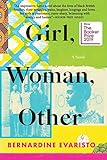 Girl, Woman, Other by Bernardine Evaristo: Joint winner of the 2019 Booker Prize and first black woman to receive the award, Evaristo’s eighth novel follows the lives of 12 black British people—predominately, thought not entirely, women—from different classes and identities. The Booker judges called the novel “a must-read about modern Britain and womanhood” that “deserves to be read aloud and to be performed and celebrated in all kinds of media.” (Carolyn)
Girl, Woman, Other by Bernardine Evaristo: Joint winner of the 2019 Booker Prize and first black woman to receive the award, Evaristo’s eighth novel follows the lives of 12 black British people—predominately, thought not entirely, women—from different classes and identities. The Booker judges called the novel “a must-read about modern Britain and womanhood” that “deserves to be read aloud and to be performed and celebrated in all kinds of media.” (Carolyn)
 Essays One by Lydia Davis: In the first half of a two-volume collection, Davis gathers a collection of nonfiction writing from the last five decades. The famed short story writer’s essays about reading and writing explore her artistic influences, literary criticism, and even annotations of her own work—which offers a rare deep dive into her craft. Publishers Weekly‘s starred review says readers “should take the opportunity to learn from a legend.” (Carolyn)
Essays One by Lydia Davis: In the first half of a two-volume collection, Davis gathers a collection of nonfiction writing from the last five decades. The famed short story writer’s essays about reading and writing explore her artistic influences, literary criticism, and even annotations of her own work—which offers a rare deep dive into her craft. Publishers Weekly‘s starred review says readers “should take the opportunity to learn from a legend.” (Carolyn)
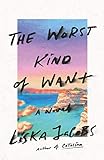 The Worst Kind of Want by Liska Jacobs: Pricilla (Cilla) Messing has spent her life caring for others so she expects more of the same when she’s called to Rome to babysit her out-of-control teenage niece. Instead, while falling under the spell of scenic Italy and a forbidden flirtation, Cilla’s erratic behavior jeopardizes her future. Publishers Weekly wrote that the “intoxicating” novel is “a love letter to Italy and an evocative study of grief and desire.” (Carolyn)
The Worst Kind of Want by Liska Jacobs: Pricilla (Cilla) Messing has spent her life caring for others so she expects more of the same when she’s called to Rome to babysit her out-of-control teenage niece. Instead, while falling under the spell of scenic Italy and a forbidden flirtation, Cilla’s erratic behavior jeopardizes her future. Publishers Weekly wrote that the “intoxicating” novel is “a love letter to Italy and an evocative study of grief and desire.” (Carolyn)
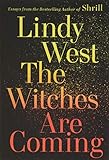 The Witches are Coming by Lindy West: In a follow-up to her bestselling memoir Shrill, West’s new essay collection—complete with a title playing on the idea of “witch hunt”—explores our current cultural moment. Whether it’s #MeToo, misogyny in the Trump era, or how the media covers serial killers, West’s writing is biting, funny, and whip smart. “Satirical, raw, and unapologetically real, West delivers the bittersweet truths on contemporary living,” says Kirkus. (Carolyn)
The Witches are Coming by Lindy West: In a follow-up to her bestselling memoir Shrill, West’s new essay collection—complete with a title playing on the idea of “witch hunt”—explores our current cultural moment. Whether it’s #MeToo, misogyny in the Trump era, or how the media covers serial killers, West’s writing is biting, funny, and whip smart. “Satirical, raw, and unapologetically real, West delivers the bittersweet truths on contemporary living,” says Kirkus. (Carolyn)
 On Swift Horses by Shannon Pufahl: Purahl’s debut novel set in the 1950s follows Muriel, a 21-year-old newlywed who has moved from rural Kansas to San Diego with her husband, Lee. Listless and restless, Muriel sets off to find the brother-in-law she harbors deep affection for. Kirkus‘ starred review says, “the book is filled with such rhythmically lovely, splendidly evocative, and masterfully precise descriptions.” (Carolyn)
On Swift Horses by Shannon Pufahl: Purahl’s debut novel set in the 1950s follows Muriel, a 21-year-old newlywed who has moved from rural Kansas to San Diego with her husband, Lee. Listless and restless, Muriel sets off to find the brother-in-law she harbors deep affection for. Kirkus‘ starred review says, “the book is filled with such rhythmically lovely, splendidly evocative, and masterfully precise descriptions.” (Carolyn)
 The Innocents by Michael Crummey: Finalist for the 2019 Giller Prize, Crummey’s latest novel follows two recently-orphaned siblings as they navigate the brutal conditions of 19th-century Newfoundland. About The Innocents, Smith Henderson writes, “what makes this story timeless is Crummey’s rich depiction of the human heart in extremis, the unflagging beat of life in a world that is too much to bear.” (Carolyn)
The Innocents by Michael Crummey: Finalist for the 2019 Giller Prize, Crummey’s latest novel follows two recently-orphaned siblings as they navigate the brutal conditions of 19th-century Newfoundland. About The Innocents, Smith Henderson writes, “what makes this story timeless is Crummey’s rich depiction of the human heart in extremis, the unflagging beat of life in a world that is too much to bear.” (Carolyn)
 The Starless Sea by Erin Morgenstern: Eight years after The Night Circus became a literary and book club sensation, Morgenstern returns with her much anticipated sophomore novel, which has received starred reviews from Publishers Weekly, Kirkus, Booklist, and Library Journal. Steeped in her signature fantastical style, the novel follows a graduate student who stumbles upon a mysterious book that leads him to a subterranean library called the Harbor on the Starless Sea—and that’s just the beginning of the tale. (Carolyn)
The Starless Sea by Erin Morgenstern: Eight years after The Night Circus became a literary and book club sensation, Morgenstern returns with her much anticipated sophomore novel, which has received starred reviews from Publishers Weekly, Kirkus, Booklist, and Library Journal. Steeped in her signature fantastical style, the novel follows a graduate student who stumbles upon a mysterious book that leads him to a subterranean library called the Harbor on the Starless Sea—and that’s just the beginning of the tale. (Carolyn)
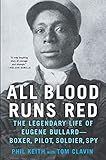 All Blood Runs Red by Phil Keith and Tom Clavin: This new biography excavates the fascinating untold and nearly lost story of Eugene Bullard, a globally famous boxer, the first African-American fighter pilot, a WWII French spy, and nearly everything in between. In a starred review which calls the book “dazzling,” Publishers Weekly writes, “This may be a biography, but it reads like a novel.” (Carolyn)
All Blood Runs Red by Phil Keith and Tom Clavin: This new biography excavates the fascinating untold and nearly lost story of Eugene Bullard, a globally famous boxer, the first African-American fighter pilot, a WWII French spy, and nearly everything in between. In a starred review which calls the book “dazzling,” Publishers Weekly writes, “This may be a biography, but it reads like a novel.” (Carolyn)
